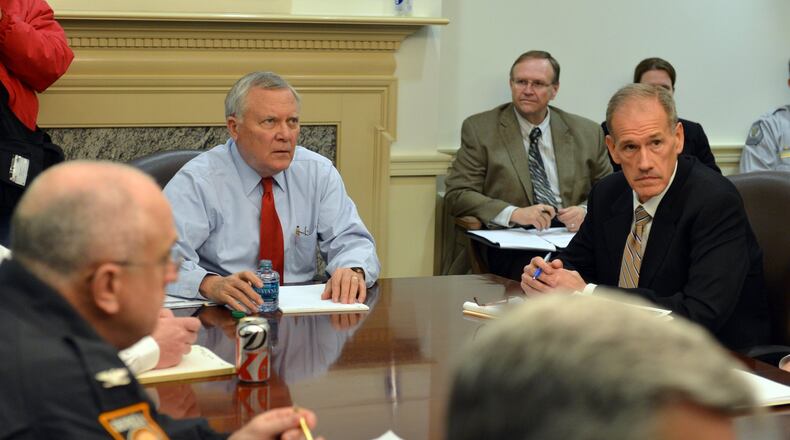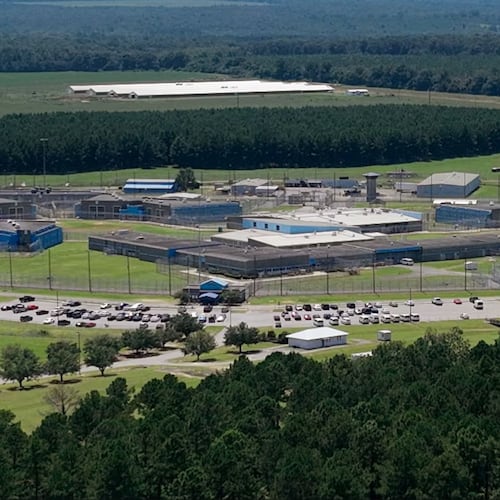The drab statehouse cafeteria was almost empty as the first icy wave zeroed in on Atlanta, save for a long table occupied by Gov. Nathan Deal and his closest advisers. They were refueling before another blast of wintry weather that would test so much more than the governor’s crisis management abilities.
Exactly two weeks earlier, Deal was at a Ritz-Carlton awards banquet with Atlanta's mayor when another storm bearing down on the region dropped its first snowflakes. Now he was munching on Chick-fil-A in a gray cafeteria as the few remaining state workers around him heeded the warning to head home.
“It’s a far more proactive response,” Deal told a reporter before rushing off. “That’s for sure.”
Nothing has so challenged the governor — and the public’s faith in his leadership — as the barrage of ice storms that pounded Georgia these past weeks. His response to the two storms provides a glimpse of the leadership acumen of Georgia’s most powerful politician.
The ineffective preparation and ham-handed early reaction to the midday snowfall on Jan. 28 that humiliated the state mar Deal's record. But two weeks later came a far more severe storm that offered the governor a second chance to restore trust. And as the last remnants of that storm rumbled out, the governor was ready to declare victory.
“If you do things right, it does restore confidence,” Deal said. “And I think we did things right this time.”
The errors of January
As the January storm loomed, Deal refused to stray from a busy schedule of photo opps and meetings. He waited until hours after droves of drivers were stranded on icy roads to declare an emergency. And his tongue-twisting explanations were eagerly seized by national media who made the government response the butt of jokes on late-night television.
Yet other character traits would come to his aid in the days that followed.
His keen sense of loyalty meant he could delegate to deputies he trusted implicitly. It also spared — at least for now — the job of Charley English, the emergency manager responsible for some of the worst miscues in January, who was said to have performed admirably during this storm.
A belief in the ideal of personal responsibility drove Deal privately to frustration over the blame aimed at his administration during the gridlock, but publicly it led him to urge residents to not depend overly on the government as the next storm neared.
And he learned to embrace a careful calculation that his team employed with other political problems: It’s easier to scale back an overreaction than to look caught off guard by a more measured response.
Deal’s re-election bid was an undeniable undercurrent throughout. With primaries set for sunny May and the general election almost a year away, the concern wasn’t whether voters would reject Deal because he handled the storm poorly. It was whether his rivals would successfully cast the response as part of a broader pattern of failed leadership.
An early test
Behind closed doors, the soul searching began almost immediately after the January storm. Deal’s chief operating officer, Bart Gobeil, wrote staffers that he was launching an internal review to “avoid the mistakes we made this past week.” He and English engaged Georgia Tech and The Weather Channel to update the state’s emergency app.
Deal tapped a task force of outside experts to craft recommendations. He ordered state officials to send school administrators frequent weather updates to subtly prod them to close school doors if needed. And an alert system that was already in place to warn about missing or endangered children was activated to transmit emergency weather updates.
The brief burst of snow flurries that blanketed the city on Feb. 6 was an early test of the new full-throttle response. Heavy clearing equipment was at the ready, salt and sand supplies were replenished, and an emergency command center was opened long before the first flake hit the earth.
The next day, as Deal toured Alpharetta High School, he joked that he hoped he wouldn’t see a reporter trailing him that weekend as another wintry storm loomed. He was only off by a day.
Behind the scenes
As forecasts for the coming ice storm worsened Sunday evening, Deal brought in his communications staff to sound the alarms. Soon, the first major decision had to be made: whether to declare a state of emergency for a wide swath of Georgia almost 36 hours before the first wave was to hit.
The governor knew Georgia could be branded a laughingstock again if he penned the order and the storm then petered out. But mindful of the lessons of January’s storm — he was panned for waiting until hours after snowfall paralyzed the city to sign a similar order — he pulled the trigger.
Deal’s aides and others in those meetings said the governor never gave a speech demanding a better job this time around. There was no cursing, no fits of rage. They describe an even-tempered man who acted largely off-screen like he did on the cameras.
“He never said, ‘You’ve got to get it right’ because it was implicit,” said Brian Robinson, one of his deputies.
Deal is neither flashy nor showy, but frequent press conferences and photo opps became a fixture of his storm response, if only to reflect the image that Deal was in command. Even Deal’s Twitter feed began to resemble that of a hyperactive teenager.
At morning briefings of his emergency command staff, the governor sat sternly at the end of a boardroom table. At press conferences, he seemed more patient and less agitated on camera than he did in January, when he appeared defensive and, at times, combative with interviewers.
He was better rested, too, in part because he didn’t make it back to the Governor’s Mansion until well after midnight amid January’s icy gridlock.
Intensive pre-press conference briefings with utility executives and deputies gave him a better command of the evolving facts and figures. With cameras rolling, he played the eager role of quarterback, handing off questions he couldn’t answer to deputies standing behind him.
‘Caution paid off’
Several Deal staffers bunkered at the Governor’s Mansion, and each morning first lady Sandra Deal would insist they eat a big breakfast of eggs, sausage and grits since most grocery stores and restaurants were shuttered.
The governor’s convoy of all-wheel-drive SUVs rumbled along icy city streets to pick up staffers in Buckhead and Midtown, giving Deal and his aides a glimpse of the weather’s impact beyond the statehouse.
At the office, he called more than 90 local elected officials gauging their status. Two who picked up the phone thought it was a prank call, a third could hardly hear because he was trying to scrape a nearby road free of ice.
As the storm pounded Georgia, the same critics who blasted Deal’s response in January stayed silent or offered grudging kudos. Others said he was earning praise simply for not falling flat after setting the bar so low in January.
“What has our state come to when we’re thankful when the governor actually did his job?” offered DuBose Porter, the chairman of the state Democratic Party.
Deal has surprisingly rejected the “lessons learned” story line that seems instinctive to those outside his bubble. The all-out effort that unfolded last week, he said, is thanks to ample advance warning from forecasters and solid preparations from the state.
An introvert at heart, Deal isn’t game for public introspection, declaring only that “our caution paid off” after the storm finally rumbled past.
When pressed, though, the governor said the past few weeks have reinforced a valuable lesson. Where once he had been so wary of “crying wolf” when a threat looms, he has a new outlook.
“Trust the people,” he said. “When you give them the information, they respond appropriately.”
About the Author
Keep Reading
The Latest
Featured




